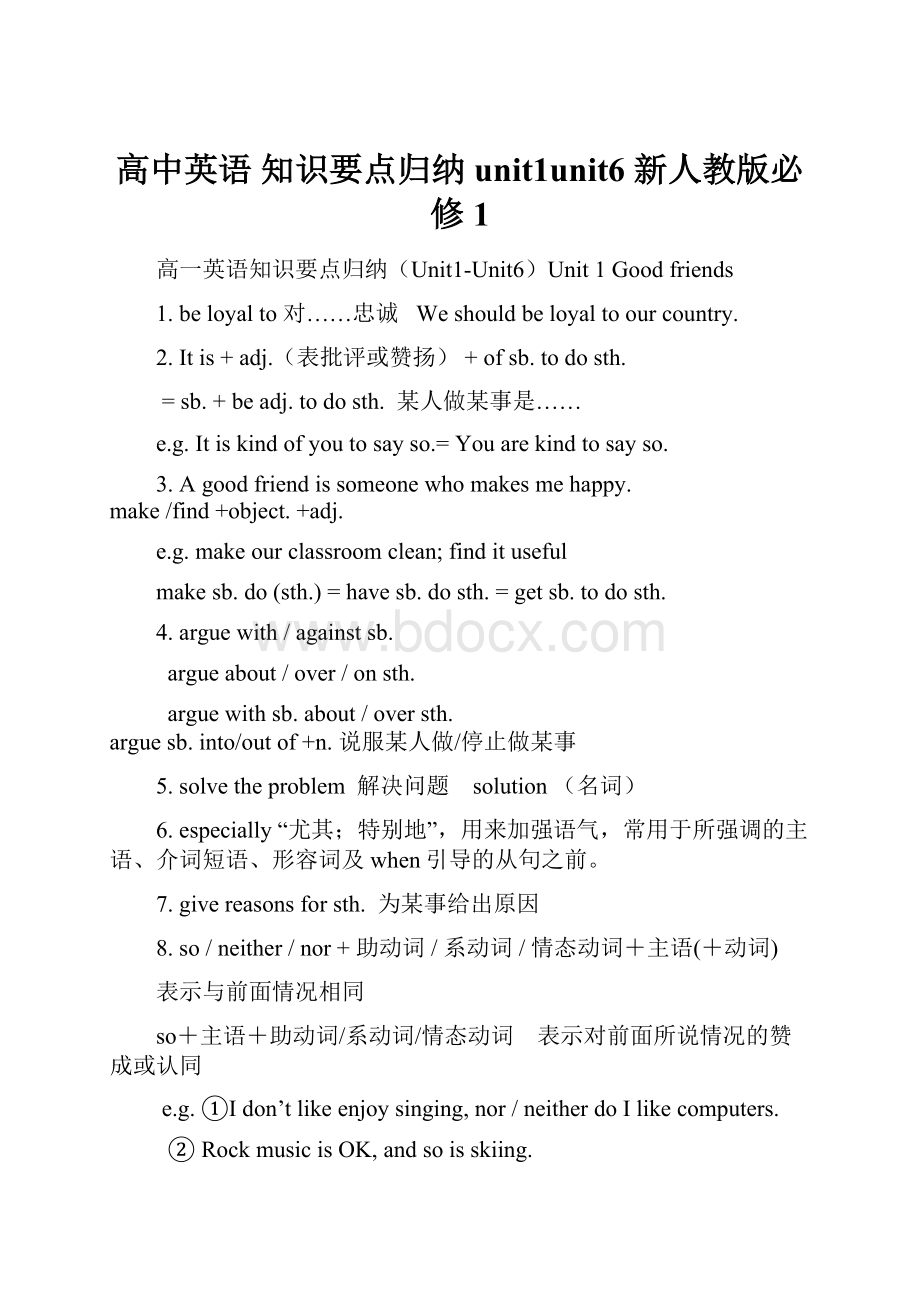高中英语 知识要点归纳unit1unit6 新人教版必修1.docx
《高中英语 知识要点归纳unit1unit6 新人教版必修1.docx》由会员分享,可在线阅读,更多相关《高中英语 知识要点归纳unit1unit6 新人教版必修1.docx(40页珍藏版)》请在冰豆网上搜索。

高中英语知识要点归纳unit1unit6新人教版必修1
高一英语知识要点归纳(Unit1-Unit6)Unit1Goodfriends
1.beloyalto对……忠诚 Weshouldbeloyaltoourcountry.
2.Itis+adj.(表批评或赞扬)+ofsb.todosth.
=sb.+beadj.todosth. 某人做某事是……
e.g.Itiskindofyoutosayso.=Youarekindtosayso.
3.Agoodfriendissomeonewhomakesmehappy.
make/find+object.+adj.
e.g.makeourclassroomclean;findituseful
makesb.do(sth.)=havesb.dosth.=getsb.todosth.
4.arguewith/againstsb.
argueabout/over/onsth.
arguewithsb.about/oversth.
arguesb.into/outof+n.说服某人做/停止做某事
5.solvetheproblem 解决问题 solution(名词)
6.especially“尤其;特别地”,用来加强语气,常用于所强调的主语、介词短语、形容词及when引导的从句之前。
7.givereasonsforsth. 为某事给出原因
8.so/neither/nor+助动词/系动词/情态动词+主语(+动词)
表示与前面情况相同
so+主语+助动词/系动词/情态动词 表示对前面所说情况的赞成或认同
e.g.①Idon’tlikeenjoysinging,nor/neitherdoIlikecomputers.
②RockmusicisOK,andsoisskiing.
③-Heworksveryhard. -Sohedoes.
9.hatevt.憎恶,憎恨;厌恶,很不喜欢,
句型为:
hatesth./sb.;
hatedoing/todosth.;
hatesb.doing/todosth.
10.beinto=befondof 对某事有兴趣,喜欢……
11.surftheInternet=goontheInternet 上网
12.allthetime 一直,始终
13.imaginedoingsth. 想像做某事
14.alone adj.单独的,独自的(只能作表语)
adv.单独地 e.g.①ShewatchesTVwhensheisalone.
独自一人时,她便看电视。
②ForyearsMarylivedaloneinNewYork.
玛丽孤身一人在纽约生活了好几年。
lonely adj. 1.孤独的,孤寂的
2.偏僻的,人迹罕至的(既可作表语,也可作定语)
15.play=act e.g.TomHanksplaysamannamedChuckNoland.
16.so...that... 如此……以至于……,
that在此引导结果状语从句(有时可能省略)
so+adj./adv.+that…
so+adj.+a(n)+n+that…
sofew/many+复数名词+that…
somuch/little+不可数名词+that…
so加形容词或副词置于句首引起倒装
区别:
such+a(n)+adj.+n.+that…
such+adj.+不可数名词/复数名词
(注:
这里的adj.不能是many,much,few,little,如果加这些形容词,用so…that…)
17.OnedayChuckisonaflightacrossthePacificOceanwhensuddenlyhisplanecrashes.
When(=atthattime/atthatmoment)是一个并列连词的作用,表示前一个动作正在进行时突然发生此事。
多用于句型:
bedoing…when…,beabouttodo…when…,句中isonaflight等于isflying。
例如:
①Heisabouttogowhenthetelephonerang。
她正要出去这时电话铃响了。
②IwaswalkingonthestreetyesterdaywhenIsawanoldfriend。
昨天正在街上走着忽然碰上一个老朋友。
18.adesertedisland 荒岛
19.survive:
continuetoliveorexist 幸存;活下来
e.g.HerparentsdiedintheSARSepidemic,butshesurvived.
她的双亲在“非典”流行时去世,但是她幸存下来。
20.allalone=allbyoneself 独自地;完全靠自己;独立地
21.huntfor 搜索;追寻;寻找
22.make(a)fire 生火
23.inorderto 为了……
e.g.Westartedearlyinordertoarrivebeforedark.
为了在天黑前到达,我们很早就动身了
1)soasto…=inorderto...,但前者一般不用于句首
2)否定式在to前加not
3)相应的目的状语从句由sothat...或inorderthat...引导
24.developafriendshipwithsb. 与某人发展友谊
25.eventhough=evenif即使
26.treat…as… 把……看作……
27.realize(realize) vt.认识;明白;实现。
例:
①Ididn'trealizethisuntilyoutoldme.
直到你告诉了我才认识到这一点。
②FinallyIrealizedwhathemeant.最后我明白了他的意思。
③Intheendherealizedhishopeforbeinganartist.
最后他实现了当艺术家的意愿。
28.sharehappinessandsorrow同甘共苦
sharevt.&vi.分担;分享;共同具有/使用
1)sharevt.常跟名词作宾语,
构成的搭配有:
sharesth.withsb.与某人共享。
例:
①Theyshareallhousework,includingwashing,cookingandlookingaftertheirchild.他们分担所有家务,包括洗衣,做饭,看孩子。
2)sharevi. 搭配是:
sharein...共享……
例:
②Shesharesinmytroublesaswellasmyjoys.她与我同甘共苦。
3)sharen."一份","份额"
例:
③Wemustdoourshareforourcountry.我们必须为国家做出一份贡献。
29.careabout关心,介意,在乎
e.g.Itisimportanttohavesomeonetocareabout.
carefor喜欢;照顾
e.g.①Idon’tcareforfootball.
②Wouldyoucareforacupoftea?
③Shecaresforhersickmother.
30.shouldhavedone 本该做……(而实际上没有做),常含有责备的意味。
31.makefriendswithsb.和某人交朋友(注意friends〈复数〉)
32.forexample介词短语,为插入语,可置于句首、句中或句末,用逗号隔开,一般只以同类人或同类事物中的“一个”为例。
suchas列举同类人或同类事物中的几个例子,放在被列举的事物或名词之前,as不加逗号。
33.learnalessonfromsb.接受教训
34.telllies/alie 撒谎,为固定搭配
35.regard…as… 把……当作 beregardedas
e.g.Manypeoplekeepdogsaspetsbecausedogsareregardedasloyalfriendstopeople.
36.makeadifference有差别;有关系
makenodifference没有差别;无关紧要
makeagreatdifference区别很大;有很大关系
37.Youguessedit!
38.havefun玩得愉快
funn.[U]娱乐,乐趣;玩笑,嬉戏;有趣的人(或事物)
for/infun闹着玩地,不当真地
39.dropsb.aline给某人写短信
40.keep...inmind 记住
41.asshortaspossible 尽可能简洁
42.laughat/makefunof/playajokeon 取笑;嘲笑
43.inone’sopinion依……看来,依……之见
语法:
直接引语(DirectSpeech)和间接引语(IndirectSpeech)
(1)
直接引语通常用引号(“”)括起来,间接引语在多数情况下都构成一个宾语从句。
1.如果引用的句子原来是一个陈述句,在间接引语中我们要注意下面几点:
(1)在引语的开头用连词that,有时可以省略
(2)根据意思改变人称
(3)注意间接引语中的谓语动词时态的变化
(4)根据意思将指示代词,地点及时间状语作必要的更动
2.直接引语是一个疑问句变间接引语时,除了注意人称、状语等的变更和时态一致之外,还要注意:
(1)把疑问句语序变为陈述句语序,也就是说要把主语放在谓语的前面
(2)在这种引语前“that”是永远也不能用的。
如果是一般疑问句、选择疑问句或反意疑问句,在引语前要用连词whether或if。
选择疑问句不用if,只用whether(whether…or…搭配,一般不用if)
(3)如果是特殊疑问句,仍用其疑问词作为连接词来引导从句。
3.在时态变化时,要注意如果直接引语是客观真理或客观事实,变为间接引语时,时态不用改变。
4.一般在引述陈述句的间接引语时,用动词said,told;在引述疑问句时,一般用asked,said,wondered等。
Unit2Englisharoundtheworld
1.
(1)forthefirsttime第一次(时间状语)
(2)thefirsttime第一次(引导时间状语从句)
e.g.______IcameintoNo.1MiddleSchool,Imetalotofoldfriends.
A.Thefirsttime B.Forthefirsttime
C.Forthetime D.Thetime (key:
A)
(3)Itis/wasthefirsttime…后接句子,强调到说话时为止某一情况或动作的次数,句中常用完成时态,first可换用其他序数词。
e.g.Itwasthefirsttime(that)IhadleftBeijing.
那是我第一次离开北京。
2.WhatisitthatJoecan’tfindinthebathroom?
Joe在浴室里不能找到的是什么?
这是一个强调句式的特殊疑问形式。
Itis/was+被强调成份+that(who)+句子剩余部分
e.g.
(1)对主语作强调
ItisJoethat/whocan’tfindthetoiletinthebathroom.
(2)对宾语作强调
ItisthetoiletthatJoecan’tfindinthebathroom.
(3)对状语作强调
ItisinthebathroomthatJoecan’tfindthetoilet.
强调句式的特殊疑问句变化:
When/Why/How/What/Whereis/wasitthat…?
3.haveagoodflight 航行愉快
4.alltheway 从远道;一路上
5.must表示肯定猜测
must+do(现在)/ must+havedone(过去)
否定式为can’t/couldn’t+do/havedone
e.g.①Youmustbeverytired.
②Thegroundiswet.Itmusthaverainedlastnight.
6.makeoneselfathome 别客气,别拘束
7.mean+n./pron./doing意味着
mean+todo打算做……
Whatdoyoumeanby...?
"你说(做)……是什么意思?
"
8.onone’swayback(to…)/onone’swayto…
9.abit=alittle修饰adj./adv.的原级或比较级
〈区别〉notabit=notatall=notintheleast 一点儿也不
notalittle=notslightly=verymuch 相当多的(地);非常
abitof+n. alittle+n.
10.nativelanguage=mothertongue母语
nativen.[C]当地人,本国人
11.in…situation处于……的情形、境遇、位置
12.majorityn.大多数;大部分。
当themajority作主语时,谓语动词可以是单数,也可以是复数。
但当"themajorityof+n."做主语时,谓语动词由后面的名词来决定。
例:
①Themajoritywere/wasagainsttheplan.大多数人反对这个计划。
②Themajorityofthebooksarekeptupstairs.大多数书籍放在楼上。
③Themajorityofthemoneyisspentonbooks.大多数钱都花在了书上。
13.intotal=inall/asawhole总共,合计
14.anumberof+复数名词+复数谓语
thenumberof+复数名词+单数谓语
15.beequalto相等的;胜任的
e.g.①TomisequaltoJohninheight.
②Myheartisnotequaltotherace.
③Hefeltequaltocarryingouttheplan
16.except同类别事物的整数中除去若干
exceptfor从整体中排除部分,前后名词是不同类的
exceptthat从句
e.g.①ExceptTom,theyareallworkers.
②Theroomisemptyexceptforabrokenchair.
17.communicatevt.
(1)传达;传递;传播(+to)
vi.
(1)交流思想(或感情,信息等);交际,交往(+with)
(2)通讯,通话(+with)
e.g.①Didshecommunicatemywishestoyou?
她有没有把我的祝福转告你?
②Welearnalanguageinordertocommunicate.
我们学习语言是为了交流思想。
③Hehadnowaytocommunicatewithhisbrother.
他没有办法与他兄弟联系。
18.WithsomanypeoplecommunicatinginEnglisheveryday,wecanseethatitwillbemoreandmoreimportanttohaveagoodknowledgeofEnglish.
(1)withn./pron.doingsth.
这是with的复合结构,在句中可作状语,表示原因。
e.g.①Withthedoctorstreatingme,Iwillrecoversoon.
有这些医生给我治疗,我很快就会康复。
②Withtheworkwelldone,hegotpraised.
由于这工作做得好,他受到了表扬。
除了表原因,还可表示伴随动作、行为方式、条件或结果等。
在这一结构中,如果名词/代词和分词之间是主动关系,用现在分词;
如果是被动关系,则用过去分词形式。
with+n./pron.+adj./adv./介词短语
with+n./pron.+doing(表示动作在正在进行)
with+n./pron.+todo(表示要执行的动作)
with+n./pron.+done(表示动作的完成或被动)
(2)“moreandmore+多音节形容词/副词”
或者”形容词/副词的比较级+and+形容词/副词的比较级”
用来表示“越来越……”
e.g.①Heisrunningfasterandfaster.他现在跑得越来越快了。
②Itwasgettingdarkeranddarker.天越来越黑了。
18.haveagoodknowledgeof…具有(丰富)的……知识;熟知……
knowledge在此意为“掌握,了解”,与不定冠词连用。
19.stayup熬夜
20.leavethedooropen 让门开着
leave在此意为“让……处于某种状态”
21.ManystudentswanttoknowaboutthedifferencesbetweenAmericanEnglishandBritishEnglish.
(1)know和knowabout的区别:
know是vt.后面跟名词,代词,意为“认识”“知道”指人与人之间直接的认识,了解;
而knowabout(of)意为知道,了解关于……的情况,指间接地“了解”,或听说过某人,某物。
e.g.①Idon’tknow/abouthim.我不认识/没听说过他。
②Iknowabout(of)her,butIcan’tsaythatIknowher.我知道有其人,但谈不上认识她。
(2)tellthedifferencesbetween…and…
说出……与……之间的差异/差别
22.comeabout=happen;takeplace 无被动
23.Thereisnoquickanswertothequestion. 问题的答案,介词常用to
24.staythesame stay意为"继续,保持",连系动词
e.g.Ihopetheweatherwillstayfine.我希望天气能持续放晴。
25.while 并列连词,“而,却”,表前后意义的对比和转折。
26.endupwith 以……为结局;结果会……
endupdoingsth.
endup+介词短语
27.moreorless 大约;或多或少;在一定程度上
28.make…differentfrom… 使……与……不同
29.主语+have+(no,little,some,much,great…)difficulty/troubleindoingsth./withsth.
e.g.Everyoneinthetownknewhim,sowehadnotrouble/difficultyinfindinghishouse.
注意:
使用这一句型应注意以下四点:
(1)difficulty和trouble为不可数名词,意为“困难”。
(2)修饰语主要有:
no,little,some,much,great,(not)any等。
(3)句中介